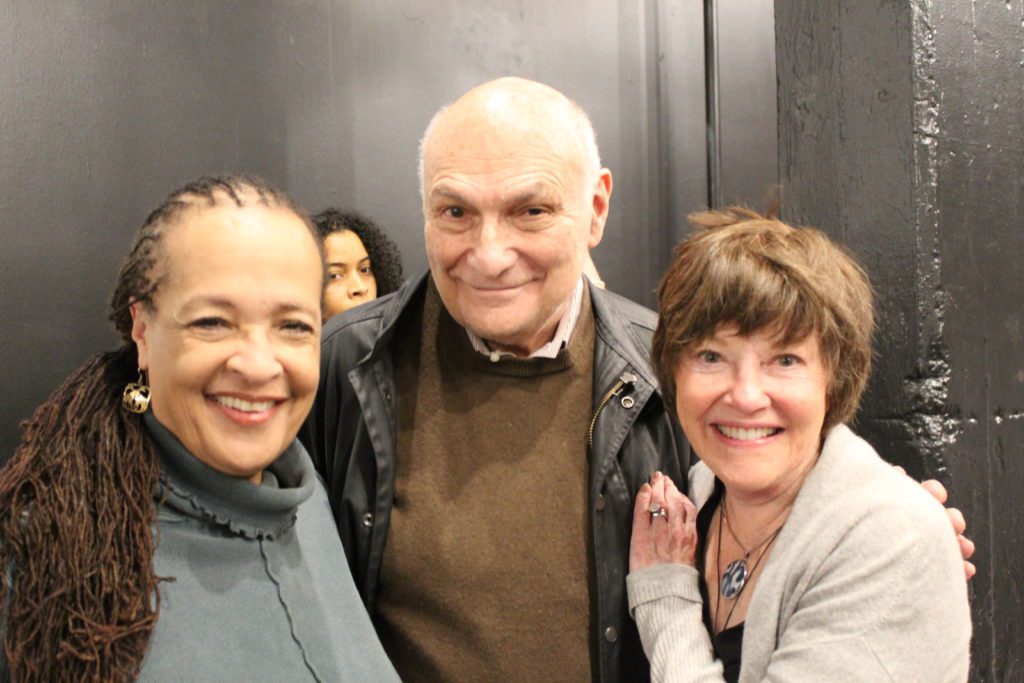Chorus Stands Out in ‘Oresteia’ at Shakespeare
By • April 30, 2019 0 1894

The Shakespeare Theatre Company’s new production of playwright Ellen McLaughlin’s adaptation of Aeschylus’s “The Oresteia” — a compression of the rarely performed trilogy of “Agamemnon,” “The Libation Bearers” and “The Eumenides” — opened at Sidney Harman Hall on April 30.
It is something of an auspicious event for Washington. The production, which runs through June 2, is the last to be directed by Artistic Director Michael Kahn, who is reaching the end of a 33-year tenure that began at the Folger, the company’s original home, in 1986. During that remarkable stretch, Kahn has overseen more than 160 shows and directed 65 productions, including several epic projects that seemed to make alchemy out of compression.
Kahn has said he has always wanted to do all of “The Oresteia,” a showcase work of Greek tragedy. It abounds in ambition, embodying the conjunction where classical ideas and civilization meet the invention of modern processes, ideas and concepts.
We know the names: the headstrong king of Mycenae Agamemnon (Kelcey Watson), who embarks on a war with Troy and sacrifices his daughter Iphigenia (Simone Warren) to the gods to ensure success, while taking the seer Cassandra (Zoë Sophie Garcia) as his lover. His queen, Clytemnestra (Kelley Curran), waits and seethes during the years of his absence, plotting his eventual murder. She, in turn, is killed by her son Orestes (Josiah Bania), who is then tried for matricide in a trial that seems to mark the beginnings of the search for justice and the idea of justice, with the Furies in attendance.
McLaughlin has built a reputation around her explorations, interpretations and adaptations of the plays of ancient Greece, including an STC production of “The Persians,” also by Aeschylus, in 2008. Her version of “The Oresteia” links to our times through legacies and parallels of theater, history and politics. The ancient Greeks were inventing democracy at the same time they were creating theater, she says.
When we look at these works, they often seem distant, but also shocking and nakedly intimate, even when protected by masks. Tragedies like Sophocles’s “Oedipus Rex,” Euripedes’s “The Bacchae” and “The Oresteia” — the only surviving Greek trilogy — are jolting enactments of violent crimes, stories of Gods and humans and humans and gods, in which blood rules and transforms itself into the fuel of drama.
And there is another constant in these plays: there is almost always a chorus.
A chorus may be onstage as a group, like a court, or as dancers in a circle of celebration, like a congregation. They seem like acolytes, or white-robed initiates. In a sense, the chorus members are tour guides leading the audience into the ins and outs of the play in question.
This chorus is made up of Sophia Skiles, Jonathan Louis Dent, Corey Allen, Kati Brazda, Alvin Keith, Patrena Murray, Helen Carey and Franchelle Stewart Dorn.
Carey and Dorn have a long history with and place in the Washington theater community. Carey was part of the McLaughlin-directed production of “The Persians” and performed in other classic plays at STC, starring as Lady Macbeth opposite Stacey Keach in the Joe Dowling-directed version of “Macbeth.” Dorn appeared at STC in “Cymbeline,” “Tamburlaine,” “Edward II,” “Mourning Becomes Electra,” “Richard II” and markedly as Cleopatra in “Antony and Cleopatra.”
“This is not your traditional chorus,” said Dorn. “Choruses have been performed in many ways, sometimes in one voice, more often as a group. In the first sections of the play, the chorus is no longer a unified group, but part of the household of Atreus — servants, maids and the like. They act more as a part of the play and become less separate from the play.”
In the last act, the chorus members become the Furies, and are part of the setting in which Orestes is tried. And this is where “The Oresteia” echoes forward to our times, both in its themes — justice versus retribution, responsibility, victimhood — and on a theatrical level, for Dorn and Carey.
The two were regular performers on the “Law and Order” television series, a boon for actors in New York and regionally, bursting with sometimes small and sometimes bigger parts. “You’re right that the shows dealt exactly with those themes,” Carey said. “Sam Waterston would say he wanted the truth and someone else would say: ‘But what about justice?’ And these were serious theme for a television series,” added Dorn.
That show provided a good deal of work for members of the Washington acting community, which both Carey and Dorn consider a family.
“I wanted to be a part of this because of Michael,” said Dorn. “This is his last season and last play here and it’s amazing to be working with him.” Carey agreed. “Michael,” she said, “gave theatergoers a taste for classical theater in all of its forms. He elevated theater. He is a visionary.”
You could probably say the same for Aeschylus, Euripides and Sophocles, the Greek visionaries of theater, which seems still to come full-blown like a prophecy out of a crystal ball.

